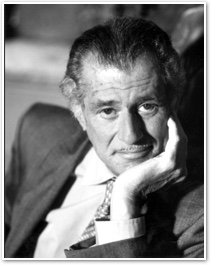World Loses a Great Storyteller
- FATHER RAYMOND J. DE SOUZA
Almost 60 years ago, a 6-foot-4 basketball player at Princeton was told by his coach, "You write basketball better than you play it."
 Frank Deford gave up playing the game then, and not long after began writing for Sports Illustrated. He was much better at writing. Better, in fact, that anyone else, for more than half a century. Even if he had been as good as Michael Jordan at basketball, he would still have been better at writing basketball — and tennis, and hockey, and boxing, and whatever else caught his attention. Deford, who died on Sunday at 78, was the best sportswriter I have ever read.
Frank Deford gave up playing the game then, and not long after began writing for Sports Illustrated. He was much better at writing. Better, in fact, that anyone else, for more than half a century. Even if he had been as good as Michael Jordan at basketball, he would still have been better at writing basketball — and tennis, and hockey, and boxing, and whatever else caught his attention. Deford, who died on Sunday at 78, was the best sportswriter I have ever read.
Superlative sportswriting begins with superlative writing. So much writing on sports is so poor that it is commonly thought that sportswriting is not for serious writers. Yet it remains a literary form. It is possible to be a belletrist writing about box scores.
Sportswriting is, in a sense, more important than other types of journalism because it reaches more people. There is more human drama in a living scratched from the Earth, more import in the contemplation of life's great questions of meaning, more intrigue in the exposés of investigative reports, but few things have the reach of sports. Millions do not follow with rapt attention and intense emotion the quarterly reports on the business pages. The capacity for uplift, for a broader vision, for the more penetrating insight touches more people in sports. And because the games themselves are less consequential, it is the storytelling that is more important than the story. Given that man is the storytelling animal, sportswriting is deeply human.
All of this is especially important for boys. Often less inclined to read at a young age than girls, it is — or at least was — the sports pages that first turned many boys on to reading. Long after they stopped imagining themselves as future Stanley Cup winners, they had awakened the infinite world of their imagination.
Reading Frank Deford's long pieces — it really didn't matter the subject — in Sports Illustrated as a teenager was for me an important introduction to the power of the word.
Reading Frank Deford's long pieces — it really didn't matter the subject — in Sports Illustrated as a teenager was for me an important introduction to the power of the word.
Those stories, thousands of words long, have largely disappeared in the digital age. While it is the case that the Internet can accommodate any length, it has also produced an attention span that is incapable of almost any depth.
One of Deford's early pieces that established him as a rising star was about another rising star, Bobby Orr. Deford went to Parry Sound and in a paragraph captured so much more than Parry Sound.
The Orrs' large stucco house is set hard against the base of Tower Hill, looking out past a railroad spur line and over a freight shed to where the Seguin River tumbles white water into the sound," he wrote 50 years ago last October. "Nearby, the Canadian Pacific rumbles overhead on one of the largest trestles east of the Rockies, whose man-made ugliness dominates the town and makes it suffer even more because of the largesse of God's beauty all around. Nothing in Parry Sound escapes that trestle. … There are 6,000 people in Parry Sound.
Nothing much escaped Deford's careful eye, and his writing linked together sports and family and culture and ambition and ethics and tragedy and endurance like, well, a great railway that stretches out to the horizon and beyond.
The danger of writing about great writers is that it seems more sensible to simply string together as many quotations as space allows. Herewith one more, a favourite from Deford's autobiography, Over Time: My Life as a Sportswriter. One of the most common questions he would get was: How do you write?
"In the morning after breakfast, in my office, on a computer. That's how I write," he wrote. "All are terribly disappointed when I tell them that. But I understand. Because writing is such a personal endeavour, people are curious as to exactly how you go about it. I don't think people ask, say, what captains of industry do in their offices. How do you talk on the phone? Tell us, Mr. Insurance Agent, how exactly do you go about selling life term policies? But it's flattering that people want to visualize you writing. I'm sure to tell them how Victor Hugo would give all this clothes to his valet every morning and then write naked, so that he couldn't go anywhere until he had written his quota for the day. I don't know if that's true, but I read it once, and it's certainly more interesting than how I write, fully clothed, without a valet, so it's a good answer, even if a lot of people don't any longer know who Victor Hugo was."
Pity those that don't know Hugo's work. And pity those, too, who never read Frank Deford.
 This is Meaghen Gonzalez, Editor of CERC. I hope you appreciated this piece. We curate these articles especially for believers like you.
This is Meaghen Gonzalez, Editor of CERC. I hope you appreciated this piece. We curate these articles especially for believers like you.
Please show your appreciation by making a $3 donation. CERC is entirely reader supported.

Acknowledgement
 Father Raymond J. de Souza, "World Loses a Great Storyteller." National Post, (Canada) June 2, 2017.
Father Raymond J. de Souza, "World Loses a Great Storyteller." National Post, (Canada) June 2, 2017.
Reprinted with permission of the National Post and Fr. de Souza.
The Author
Father Raymond J. de Souza is the founding editor of Convivium magazine.
Copyright © 2017 National Post



